TV Guide Article
Published nationally in TV Guide (December 22, 1984.) Copyright 1984.
“When Good Characters Go Bad”
by Allen Murray
A cable station in Athens, Ohio,
has riled the local populace
by mixing melodrama and real people
into one sudsy plot.
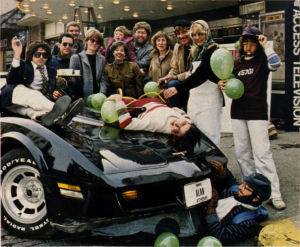
What happens when a small-town, local soap opera turns its characters loose in the real community? Confusion. Controversy. Laughter. Outrage. All adding up to dedicated viewers.
A group of friends in Athens, Ohio (pop. 20,000 and the home of Ohio University), are using the access channel of the town’s 5600-subscriber cable system to tear down the barrier between soap fantasy and local reality. In the process, they’ve ruffled some community feathers.
Described as a “Doonesbury” come to life, a “Mary Hartman” gone berserk, the soap opera began after two neighbors took a free video workshop.
After five months of “harder-than-we-had-anticipated work,” the highly publicized 15-part, tongue-in-cheek, half-hour weekly soap premiered in June. Its title: 45701 . . . the town zip code.
“An unfortunate coincidence, I’m sure,” says producer Scott Gordon, “but we may sue the post office.”
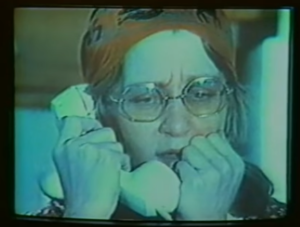
Connee gets some distressing news.
The action in 45701 centers on Connee, a simple, trusting, down-to-earth cocktail waitress, who’s trying to raise Ditch, a 16-year-old orphan with amnesia.
Her friends include Alan Starr, a flashy talent scout; Lil, an international singing star; Ludeen, a local beautician who works undercover for the police; and Ludeen’s partially-bionic sister, Nadeen, who has a machine fetish and loiters in the major-appliance sections of department stores.
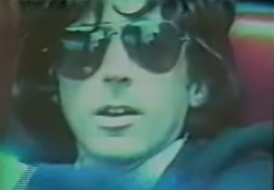
Alan Starr
It’s quite possible that flashy-dressing, Corvette-driving, Talent-Scout Alan Starr is living considerably beyond his means and that he is being unfairly framed for murder.
Ditch is kidnapped. Connee disappears. Alan Starr is the prime suspect.
Chase scenes through the city and surrounding countryside provide plenty of local scenery before Starr is captured with a grocery sack full of circumstantial evidence.
In less than 12 months and for less than $1000 (financed mostly by Gordon), the 45701 production team cranked-out more than eight hours of screen time – the equivalent of four feature films.
The first cycle of shows already has been telecast, but the programs are repeated often and there are plans for recurring 45701 specials and other shows using the soap’s characters.
Even with T-shirt sales, video rentals and syndication of the series to neighboring cable companies, Gordon expects to lose a few hundred dollars, but claims, “It’s less than most people spend on a serious hobby over the course of a year.”
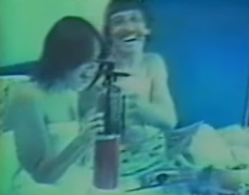
Indulging her fetish for small appliances — an unfortunate side-effect after the implant of her bionic powerpack — Nadeen fondles a fire extinguisher in her bedroom scene with everyone’s favorite bartender, Conner. From the episode entitled ‘Sex and Violence.’
Boasting original music, fancy editing, rooftop chase scenes, stunt flying, and underwater dream sequences, 45701 is surprisingly slick for a series produced by volunteers with portable equipment.
Such production values attract the audience Gordon needs in order to accomplish his real goal: to have 45701 become “an integral part of the community; a social influence; a tool for addressing local issues.”

After completing a correspondence course to attain her private pilot’s license, ‘Superstar’ Lil — decked out in her feather boa — explores the skies above the surrounding countryside, making the world a little less safe for everyone.
“Setting the characters loose in the streets assured high-visibility and let us take an active part in local politics,” he explains.
For instance, weeks before the first episode was completed, “Alan Starr” began writing a series of letters-to-the-editor to a local paper, letters that should have gone unnoticed. They were noticed.
In his outrageous letters, Starr claimed there were “between 13 and 27 ‘full-time’ homosexuals in Athens” and that those opposing the real proposed ordinance to protect them had “brains the size of cantaloupes; hearts and minds the size of cantaloupe seeds.”
Most people took the letters at face value. “Why shouldn’t they?” asked Gordon. “They read them in the newspaper.”
Then, at a televised city council meeting — the most volatile, packed and tense meeting of the year — Alan Starr showed up and asked city council to join him “in the 20th century” to support the gay ordinance.
Understandably, most people accepted Starr as a real member of the community. So, when he turned up as a principal character in the first episode of 45701, not everyone was amused.
“It’s deceptive!” cried the newspaper publisher. “Now, people will question every letter we print!”
“Sounds healthy to me,” replied Gordon, who claims one of the “social problems” he wants people to examine more closely is the media.
“I just can’t believe we let it happen,” admits David Palmer, the president of the city council, reflecting on Starr’s now-famous televised appearance (later edited into the soap).
Even those city council members objecting to Starr’s appearance before the council maintained a sense of humor. Mayor Ed Beckett, two council members, a judge, Ohio University’s president, and a variety of public officials made cameo appearances in 45701.
By incorporating real citizens into the series, 45701’s producer claims he’s opened up a “two-way street” between what’s real and what’s not.
On television, the soap’s characters take part in the city’s unique curb-side recycling program as well as its neighborhood-watch crime-prevention program.
Meanwhile, posters for the fictitious “Mothers Against Starr” find their way onto bulletin boards in the real community. A local call-in radio show has been twice “invaded” by soap-opera characters offering their opinions.
And along with hundreds of real people from around the country, two of 45701’s fictitious characters registered and competed in Hallmark’s National Jigsaw Puzzle Contest. Their videotaped participation later became part of the soap.
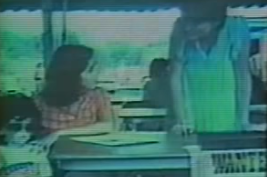
Mothers Against Starr: To call attention to the social issue of child support and ‘deadbeat dads,’ members of ‘Mothers Against Starr’ protest Alan’s non-support of his estimated 87 illegitimate children.
Given its enormous appetite for addressing controversy. It isn’t surprising that 45701 quickly incorporated itself into itself.
Within the series, the 45701 characters, on occasion, watch 45701 on television. And in one episode Alan Starr corners the director of the access channel cablecasting the soap to insist that 45701 is not a soap opera at all but a documentary about his life.
As a “community issue,” 45701 maintains a sense of humor about itself: annoyed with Starr’s public appearance before city council one irate citizen publicly asked if the actor playing Starr might not be having trouble separating fantasy from reality; might not be suffering from “character-transferal syndrome.”
After being captured while holding substantial amounts of circumstantial evidence, Alan Starr is fingerprinted, booked, and held in the county jail to await his execution.
45701 invited him to make a cameo appearance in the series. Good-naturedly, the man accepted, strummed his guitar and sang gospel songs to Alan Starr while he was in the county jail, awaiting execution.
In real life, the amateur actor who has taken the role of Starr is named Dusty Brooks and his only previous thespian experience was in elementary-school plays. Now “mostly unemployed” (he sometimes teaches courses at the nearby state prison), Brooks concedes that “it’s confusing to keep things straight. Sometimes I start to think like Alan Starr. It’s unnerving because I don’t particularly like him.”
Alan Starr, on the other hand, has never heard of Dusty Brooks.
Naturally, Starr’s psychological “problem” has been incorporated into the soap. In one episode Starr asks Athens resident and former 24-multiple-personality Billy Milligan — subject of the 1981 book The Minds of Billy Milligan — to help him with his “character-transferal syndrome.”
Milligan, a talented artist, listens sympathetically while he sketches Starr’s portrait. Back in the real world, that portrait is submitted to the local newspapers to announce the upcoming Halloween “Alan Starr Look-Alike Contest.”
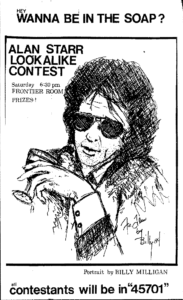
The Billy Milligan portrait of Alan Starr, turned into a real poster to promote the Halloween Look-Alike Contest.
The contest is real, but it plays a key role in the soap’s storyline. After being falsely-accused and convicted of murder and sentenced to death, Alan Starr escapes from jail on Halloween night and vanishes into the streets among a partying crowd of thousands.
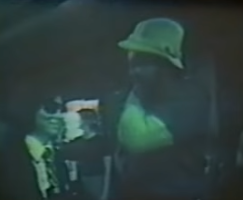
Dressed in an Alan Starr costume for the “Alan Starr Look-Alike Contest” on Halloween night, the series announcer, Paula Sue, chats with former multiple-personality Billy Milligan who — in an earlier episode — counseled Alan about his unfortunate ‘character transferal disorder.’
While the police chase after the look-alikes, the “real” Alan Starr breaks into Access Television 26, puts earlier episodes of 45701 on a video-playback machine and searches for clues leading him to the soap’s real villain. Confusing?
It’s meant to be. Says Gordon: “We want people to start thinking about the medium — to stop taking it at face value.”
Most people seem mostly excited about most of the national attention for the series.
Ecstatic because of the attention 45701 has focused on his fledgling channel, director for Access TV 26, James Rosengren (who also makes cameo appearances in the series,) claims Continental Cablevision hopes to use the interactive soap as an example for other communities around the country.
Yet despite its local popularity, success and national attention, many remain highly critical of 45701.
Some viewers feel that the series “has no business tampering with politics”; that it’s making a “mockery of serious public issues”; that its characters “should not be out in the community trying to stir up controversy”; that it’s “a practical joke gone too far.”
“They’re taking us, themselves, the world, and the series much too seriously.” argues Gordon.
But is the producer of 45701 simply sidestepping criticism?
“Of course not,” snaps Gordon, “I just think those without a sense of humor should move to another zip code.”
###